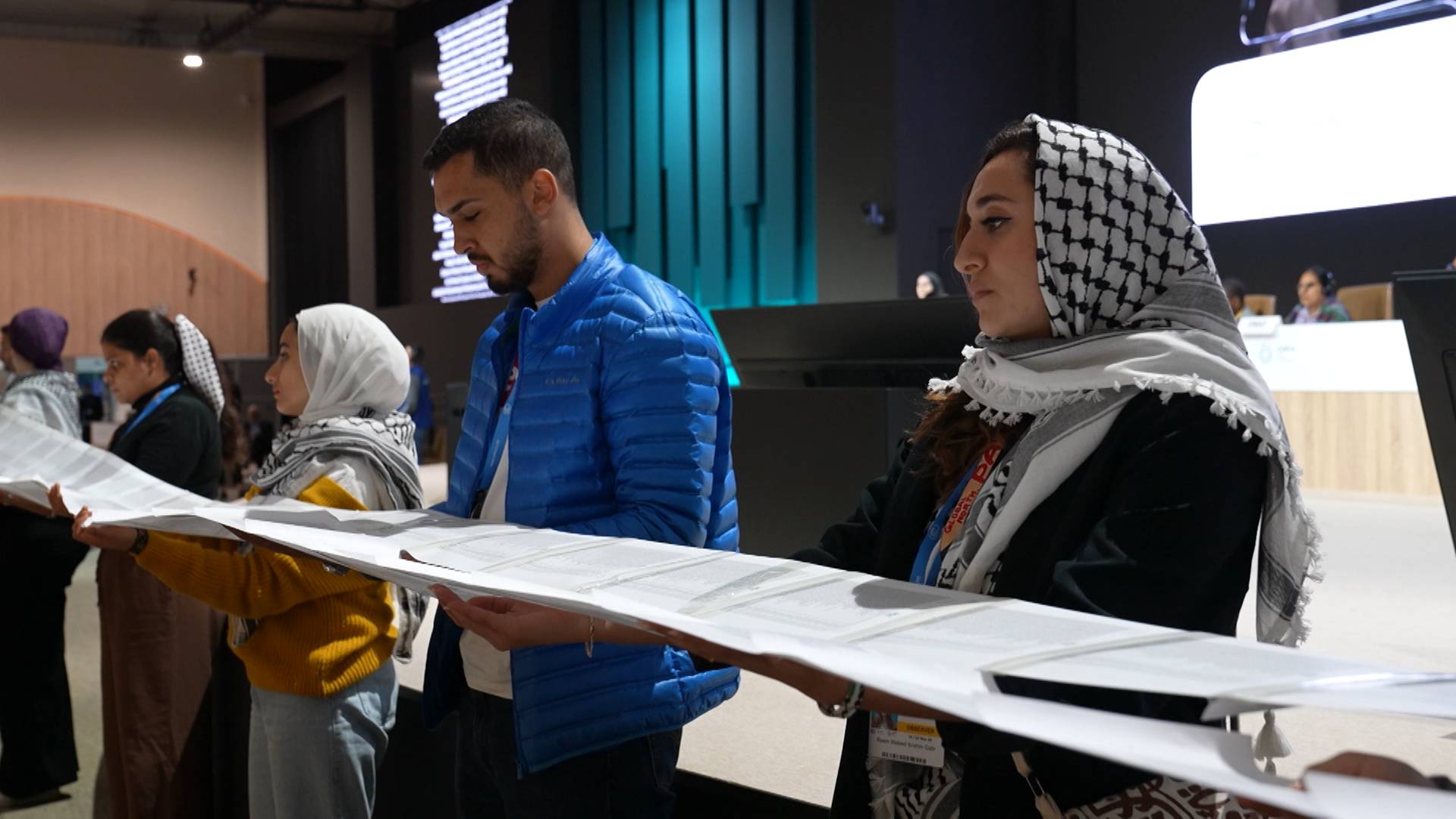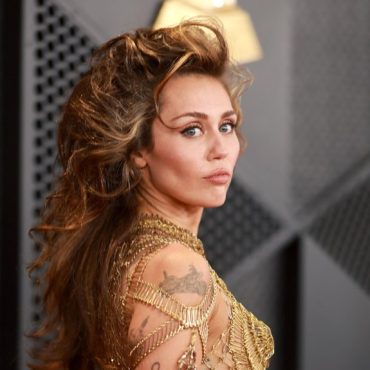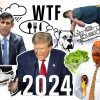This is a rush transcript. Copy may not be in its final form.
AMY GOODMAN: We’re also joined by other members of civil society from around the world. I’m going to get up right now. They have just come from across this broad room from the Caspian Plenary Hall, where they held a People’s Summit. One of the co-chairs of that summit, which is called “Pay Up, Stand Up: Finance Climate Action, Not Genocide,” where civil society unfurled the names of Palestinians who have been killed, and prayed for the dead — we’re joined right now by co-chair. The co-chair is Lidy Nacpil, who is a longtime Filipina climate activist and coordinator with the Asia Peoples’ Summit on Debt and Development and the Global Campaign to Demand Climate Justice.
Lidy, it’s so great to have you with us today. If you can talk about what the point of this plenary was? Hundreds of people packed in.
LIDY NACPIL: Well, we wanted first to feel our power of solidarity together, so it was a really great opportunity for us to come together in big numbers, such as we’ve not had in this COP because of the whole layout and the rules. So, this was a great celebration of our power together as a movement.
AMY GOODMAN: I think you should explain more. What is the issue here? Why are there so many silent protests? And explain the rules, where you cannot mention a country name. You can’t even say where you’re from.
LIDY NACPIL: Yes, that is one of the rules of the security and the UNFCCC secretariat, in order to protect, they say, the dignity and to protect respect for the different countries and governments of the countries. So we’re not allowed to mention governments. There is a policy that we can’t name and shame, but apparently that also applies to we can’t praise particular governments. So we just can’t name any government, and we can’t even say where we’re from.
But we have been doing our best to use this space to raise our voices on the critical issues that are being discussed here that affects our lives. And one of that is the genocide that’s happening in this world. It’s very much a climate issue, as it is an issue of justice, and also the issue of climate finance, which is supposed to be part of the reparations for the climate debt that is owed to our people in the Global South.
AMY GOODMAN: We’re also joined by Jana Rashed. Jana Rashed is a climate advocate, a Palestinian based in London.
JANA RASHED: Lebanon.
AMY GOODMAN: In?
JANA RASHED: Lebanon.
AMY GOODMAN: In Lebanon.
JANA RASHED: Yeah.
AMY GOODMAN: You are wearing a keffiyeh.
JANA RASHED: Yeah.
AMY GOODMAN: Inside, it was very moving at the beginning of the session, where the names of hundreds, if not thousands, of Palestinians and Lebanese were put on sheets, and people unfurled them. Talk about why you’re here today and what your message is.
JANA RASHED: Like, I am here today, first of all, to amplify the voices of my people in Palestine and Lebanon, to talk about the genocides that are happening, because we can’t be here talking about climate justice without mentioning the injustices around the world, because it’s also linked with the environment, it’s also linked with the ecocides that is happening. Because of the genocide that is currently happening in both Lebanon and Palestine, the soil are being contaminated because of the bombing. The sea is being contaminated also because of the bombing. So, we can’t be, like — we can’t have this hypocrisy in the world and be here talking about just transition and climate justice without mentioning these injustices.
And we are here as collective Palestinians. There are collective Palestinians that came up with a campaign called Global Energy Embargo for Palestine, where they call — where they are calling countries, such as Brazil, South Africa and Turkey — these countries that claim to support Palestinians, but, on the other hand, they are fueling the genocide, and they are making — like, the fuels come out from their countries to the occupation. So, yeah, we are here demanding to stop fueling genocide, demanding to stop the transportation of the fuel from these countries to the occupation.
AMY GOODMAN: We’re also joined by another climate activist. We’re joined right now by Leena Eisa, who is a climate justice advocate from Sudan. If you can talk about why you’re here today, what you’re trying to accomplish and what Sudan is facing?
LEENA EISA: I’m basically here to speak about Sudan, because no one here talking about Sudan. We are so neglected. Families are separated. Women got raped. And a lot of children lose their lives, according to nothing literally. And the media is not covering us. No one is speaking about us. There’s a genocide happening in there. And my country are bloodying. And even like every region in Sudan are neglected, bloodying. And also, like, the media are blind from us, because no one really care about us. I don’t know why. Is it because we are Black people? But Black people’s lives matter.
And I’m here today to speak up about Sudan, to speak about the women, children, men, the families, all the families that are separated now. We need to stop this war. We need to defund this genocide right now. A lot of countries are supporting this genocide. But no one else — like, no one another is supporting the Sudanese themselves. Like, there is no safety, security and all of this. And we are all here calling, like, we — there’s no one here to — like, we are here not, like, to leave anyone behind. But, unfortunately Sudanese people are behind the table, and we are depending, and no one literally talking about us.
AMY GOODMAN: Leena, I want to thank you so much for standing here and speaking up for your country, for your people. Leena Eisa is a climate justice advocate from Sudan. And I want to thank Lidy Nacpil, longtime climate activist and co-chair of the People’s Plenary that just took place. She is a Filipina climate activist. And I want to thank Jana Rashed, a climate advocate, Palestinian based in Lebanon. We thank you all for being with us.
As we wrap up our show today, we only have a few seconds. We want to also thank Harjeet Singh, who came to this summit from New Delhi, India. Thousands of people have gathered. I think it’s something like 77,000 people are registered for this U.N. climate summit in Baku, Azerbaijan. Next year, it will take place in Brazil, in the rainforest, right on the edge.
Well, we want to thank the amazing team of people who helped us today. Democracy Now! produced with Renée Feltz, Mike Burke, Deena Guzder, Messiah Rhodes, Nermeen Shaikh, María Taracena, Tami Woronoff, Charina Nadura, Sam Alcoff, Tey-Marie Astudillo. I’m Amy Goodman, with Nermeen Shaikh.











Post comments (0)